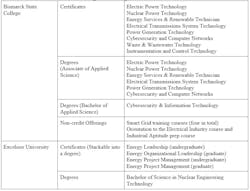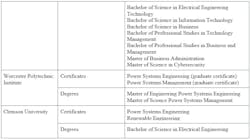Upskilling: The New Focus For Workforce Training
Energy Providers Coalition for Education (EPCE) was initially established to address a wave of retirements faced by the energy industry in the early 2000s. But this year, EPCE is placing greater emphasis on upskilling existing employees. This pivotal moment came last fall at our annual Experience Power Conference. The event offers a platform for members to network and benchmark against their colleagues in the industry. While the coalition is guided by a seven-member committee that drives its strategic direction, across all of its collaborative efforts, the Council for Adult and Experiential Learning (CAEL), established 23 years ago, serves as the connector, providing coordination and expertise.
The Coalition Member and Partners
A robust partnership between industry and academia lies at the core of EPCE’s success. Four accredited higher education institutions partner with EPCE: Bismarck State College, Excelsior University, Worcester Polytechnic Institute, and Clemson University. Each partner offers a slate of customized courses and programs. The programs chosen for the partnership are based on the education providers’ areas of strength and expertise, as well as on industry needs.
Deep Dives
One of the benefits received by EPCE member organizations at the Experience Power Conference each Fall is the ability to identify needs or gaps in their current workforce. Members also benefit from “deep dive” sessions with CAEL experts. These are customized, focused consultations that CAEL can provide to address specific needs. For example, in one consultation, CAEL experts met with Xcel Energy and Excelsior University to conduct a deep dive with their human resources department on project management and leadership programs. This led to discussions around transferable skills from one energy job to another, and the creation of Excelsior’s four certificate offerings.
Rigorous course review sessions at the Experience Power Conference often spark ideas for new focus areas to meet emerging needs. This has been the case for Worcester Polytechnic Institute (WPI). “From these meetings, the institution has been developing more courses around the implications of renewable power for power systems engineers. At the sub-baccalaureate level, curriculum meetings have also led to new and innovative offerings, such as micro-credentials and courses on SCADA (supervisory control and data acquisition) being added to a certificate program. Essentially, these meetings ensure that the curricula are current and relevant across energy organizations,” states WPI Director of Power Systems Mike Ahern.
“The challenge of getting talent into the industry is bigger than any one of us can handle on our own,” observes Gary Pfann, director of executive and staff education at the National Rural Electric Cooperative Association (NRECA). “This commitment to collaboration and problem-solving has made EPCE an enduring force in energy workforce development for the past two decades.”
Last year, Josh Pepple, senior director of Smart Grid Technology Planning at National Rural Telecommunications Cooperative, was named EPCE Learner of the Year. A veteran of the Illinois National Air Guard, Pepple served in Iraq and Afghanistan before being honorably discharged in 2008. He began work at a local electric cooperative and soon advanced to journeyman lineman. Realizing the challenges posed by the technical advances occurring in the electrical utility industry, Pepple decided to build on his skills and pursued an undergraduate degree from Excelsior University. A year later, he pursued his master’s degree, graduating with an MBA in 2019. “My education has completely underwritten the successes I’ve had and continues to open the door for new opportunities,” says Pepple.
Anthony Daniels, a radiation protection supervisor at Florida Power and Light (FPL), Turkey Point Nuclear Generating Station, began his career as a junior radiation protection technician at FPL. “As I progressed in my career, I continually asked, ‘How can I improve myself?’ and the answer was education,” he says. Daniels completed his online bachelor of science degree in nuclear engineering technology from Excelsior University in 2017, and then went on to complete his MBA, making use of the tuition discount made possible by his company’s membership in EPCE. “I use the knowledge I gained in the [MBA] program in my supervisor position all the time—from leadership skills to business goals and strategies, and more,” says Daniels.
Another EPCE member, Lana Eilertson, is a senior program manager at Innovation at Tennessee Valley Authority. Eilertson began her career in the energy sector, working as a technical intern while taking classes in Bismarck State College’s nuclear power technology program. Upon completing her internship, she was hired by Exelon, her previous employer, as an equipment operator. “The course work was instrumental in my ability to survive a lot of my initial training; there was a great deal of similar content in my generic fundamentals portion.” Learning that a bachelor’s degree would open up more career opportunities, Eilertson continued her studies at Excelsior University and graduated with a bachelor of science in nuclear engineering technology. She was promoted to Senior Site Assessor, Fleet Assessment, LaSalle County Generating Station, at Exelon, and moved to TVA last year.
“EPCE’s role in enabling change in the energy workforce development ecosystem is significant,” notes Pfann, “We need some kind of avenue or mechanism to ensure that we’ve got a good quality workforce coming through the pipeline as technology changes, and as business changes. EPCE has been in lockstep with our learning partners for a couple of decades now.” With a continuing presence in the energy education sector, EPCE appears ready to meet the challenge of the country’s considerable workforce energy needs, a task that will require the coalition to draw on the collaborative strength at the core of its partnership model.
While EPCE was established to help the talent pipeline 20 years ago, it has become an effective model of an industry/education partnership. Since 2000, more than 46,000 job-seeking and working adult learners have enrolled in EPCE, a talent development initiative. EPCE’s 3,500-plus members represent private and public utilities, energy contractors and suppliers, industry associations, unions, and workforce investment boards.
Angie Lucas is Director of the Energy Providers Coalition for Education and Director of Engagement for The Council for Adult and Experiential Learning, (CAEL), which will hold its Semi-Annual Coalition Meeting in April. Her responsibilities include fostering collaboration between energy employers and corporations, associations, contractors, and higher education institutions to design and deliver industry-approved education solutions that support training, upskilling, and reskilling of employees to meet today's energy workforce needs and prepare for the energy workforce of the future. Lucas has also served as an Advisory Circle Member, for the Indigenous Energy Initiative.
Lucas’s prior employments included working with the National Conference of State Legislatures (NCSL) where she served as a liaison between tribal leaders, the U.S. Department of Energy, industry partners, and other stakeholders to address issues impacting energy and infrastructure development across tribal lands. She also served as a project manager with the Indiana State Museum and Historic Sites, with responsibilities for research, educational program development, public/private partnerships management, and writing and administering grants.
Lucas earned her bachelor’s in Native American Social History and master’s degrees in Non-Profit Leadership at Saint Mary of the Woods College. She serves on the Advisory Board for the Electric Power Conference and the Native Energy Workforce Education Consortium (NEWEC) and volunteers with Be My Eyes, Music and Memory, and the National Park Service.
Lana Munip is Senior Research Director at CAEL. She previously was an analysis and planning consultant and assistant editor with The Pennsylvania State University Libraries, where she led various qualitative and quantitative research projects related to the library system, including multiple studies of the library experiences of diverse student subpopulations, the library’s response to Covid-19, and various large-scale survey projects. Skilled in data analysis, data visualization, qualitative research, planning & assessment, and communications, Munip also is a NVIVO 12 certified expert.
Lana holds a master’s degree in higher education (M.Ed.) with a concentration in institutional research from the Pennsylvania State University, a master’s degree in television-radio-film from Syracuse University, and a bachelor’s in economics from the University of Stirling. She is currently pursuing her Ph.D. in higher education at the Pennsylvania State University. Munip spent her early career years as a journalist in Kuala Lumpur, Malaysia.
Originally established in 1974 at the Council for Adult and Experiential Learning, Strada Collaborative, Inc. d/b/a CAEL, a nonprofite 501(c)(3) Indiana nonprofit corporation.
© 2022 Strada Collaborative, Inc. d/b/a CAEL. All rights reserved.
About the Author
Angie Lucas
Angie Lucas is Director of the Energy Providers Coalition for Education and Director of Engagement for The Council for Adult and Experiential Learning, (CAEL), which will hold its Semi-Annual Coalition Meeting in April. Her responsibilities include fostering collaboration between energy employers and corporations, associations, contractors, and higher education institutions to design and deliver industry-approved education solutions that support training, upskilling, and reskilling of employees to meet today's energy workforce needs and prepare for the energy workforce of the future. Lucas has also served as an Advisory Circle Member, for the Indigenous Energy Initiative.
Lucas’s prior employments included working with the National Conference of State Legislatures (NCSL) where she served as a liaison between tribal leaders, the U.S. Department of Energy, industry partners, and other stakeholders to address issues impacting energy and infrastructure development across tribal lands. She also served as a project manager with the Indiana State Museum and Historic Sites, with responsibilities for research, educational program development, public/private partnerships management, and writing and administering grants.
Lucas earned her bachelor’s in Native American Social History and master’s degrees in Non-Profit Leadership at Saint Mary of the Woods College. She serves on the Advisory Board for the Electric Power Conference and the Native Energy Workforce Education Consortium (NEWEC) and volunteers with Be My Eyes, Music and Memory, and the National Park Service.
Lana Munip
Lana Munip is Senior Research Director at CAEL. She previously was an analysis and planning consultant and assistant editor with The Pennsylvania State University Libraries, where she led various qualitative and quantitative research projects related to the library system, including multiple studies of the library experiences of diverse student subpopulations, the library’s response to Covid-19, and various large-scale survey projects. Skilled in data analysis, data visualization, qualitative research, planning & assessment, and communications, Munip also is a NVIVO 12 certified expert.
Lana holds a master’s degree in higher education (M.Ed.) with a concentration in institutional research from the Pennsylvania State University, a master’s degree in television-radio-film from Syracuse University, and a bachelor’s in economics from the University of Stirling. She is currently pursuing her Ph.D. in higher education at the Pennsylvania State University. Munip spent her early career years as a journalist in Kuala Lumpur, Malaysia.


